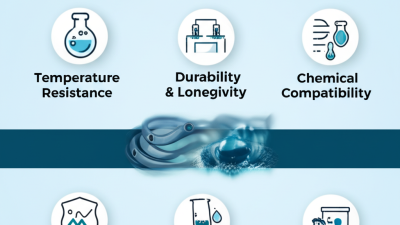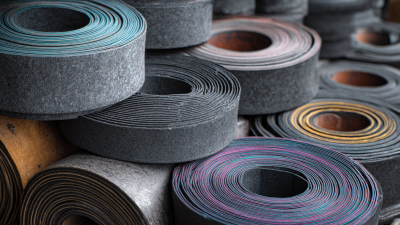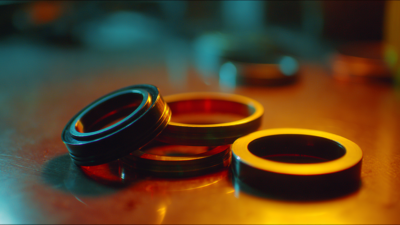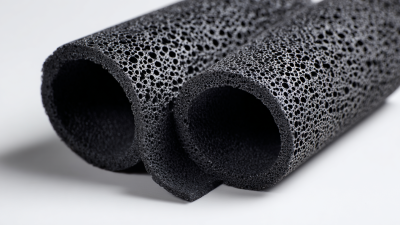Unlocking the Potential of FKM Rubber: A Deep Dive into Its Applications and Performance Metrics
Table of Contents
- Exploring FKM Rubber: Key Characteristics That Drive Performance in Industries
- Understanding the Chemical Resistance of FKM Rubber: Data and Comparisons
- Evaluating Temperature Stability in FKM Applications: Performance Metrics Revealed
- Assessing the Durability of FKM Rubber: Industry Standards and Testing Results
- Case Studies: Successful Applications of FKM Rubber in Aerospace and Automotive Sectors
- Cost-Benefit Analysis of FKM Rubber: Assessing ROI in Industrial Applications
- Emerging Trends in FKM Fluoroelastomer Compounds for Molding Applications: Insights from Recent Industry Data Reports
- FAQS
- Conclusion
- Related Posts
You know, in the ever-changing world of materials science, FKM rubber has really become a key player across a bunch of industries. I came across this pretty comprehensive report from MarketsandMarkets, and it’s saying that the global market for fluoroelastomers could hit around $4.83 billion by 2025. That’s mainly because people are craving high-performance sealing solutions, especially in automotive, aerospace, and chemical processing sectors. Speaking of experience, Sichuan Fudi New Energy Co., Ltd. has been in the game since 1998, leading the way with innovations here. They've been focusing on making and selling fluoroelastomers and other fluorinated rubbers for over 20 years now. Their product lineup is pretty impressive—think FKM/FPM precompounds and fluorosilicone rubber—that actually helps push the limits of what FKM rubber can do. Whether it’s tough temperature conditions or resisting chemicals, they really cover the bases for all kinds of applications.

Exploring FKM Rubber: Key Characteristics That Drive Performance in Industries
You know, FKM rubber is really impressive when it comes to resisting heat, chemicals, and tough environmental conditions. It’s become a pretty big deal across different industries. What makes it stand out is its fluoropolymer makeup, which lets it stay strong and perform well even when traditional rubbers can’t hang. That’s why industries like automotive, aerospace, and oil and gas love it—because they need materials that can handle extreme conditions without breaking a sweat. You’ll often find FKM being used in seals, gaskets, and O-rings, offering reliable, long-lasting solutions that can tolerate high temperatures and harsh chemicals without flip-flopping.
Unlocking the Potential of FKM Rubber: A Deep Dive into Its Applications and Performance Metrics
| Application | Temperature Resistance (°C) | Chemical Resistance | Durability (Years) | Common Industries |
|---|---|---|---|---|
| Automotive Seals | -20 to 200 | Excellent | 10+ | Automotive |
| Aerospace Components | -40 to 230 | Excellent | 15+ | Aerospace |
| Oil & Gas Seals | -20 to 220 | Good | 12+ | Oil & Gas |
| Industrial Equipment | -10 to 180 | Good | 8+ | Manufacturing |
| Pharmaceutical Seals | -20 to 200 | Excellent | 10+ | Pharmaceutical |
Understanding the Chemical Resistance of FKM Rubber: Data and Comparisons
You know, FKM rubber, which is pretty famous for its amazing resistance to chemicals, is really making waves across different industries—especially in those tough environments where conditions are harsh. What’s cool about it is its special fluoropolymer structure that gives it a serious edge against nasty chemicals, often outlasting traditional elastomers. I came across a 2022 report from the Rubber Manufacturers Association that said FKM holds up really well against solvents, oils, and acids—saving nearly 90% of its original physical properties after long-term exposure to all kinds of chemicals. That’s pretty impressive, right?
When it comes to resisting specific chemicals, tests show that FKM stays flexible and intact even after being in contact with stuff like gasoline, hydraulic fluids, or ozone for quite a while. And get this, its swelling index stays under 10% when exposed to common industrial fluids, which is why it’s such a popular pick for automotive seals and gaskets.
**A couple of tips if you're thinking of using FKM:** Make sure you consider exactly what chemicals it’ll be exposed to, so you can pick the right formulation. And don’t forget—proper installation makes a huge difference in how long your FKM components will last. Regularly checking on them can help catch any early signs of wear and tear, so everything keeps running smoothly and efficiently.

Evaluating Temperature Stability in FKM Applications: Performance Metrics Revealed
You know, when it comes to fluoroelastomers, especially FKM, they’re pretty much top-notch when it comes to handling high temperatures. That’s why they’re super important across various industries. I came across a recent report from the International Rubber Study Group, and it’s pretty impressive—FKM can handle temperatures from about -20°C all the way up to 250°C, and even short bursts up to 300°C. That kind of heat resistance is a game-changer, especially for fields like automotive, aerospace, and oil and gas, where reliability under extreme heat is absolutely crucial.
Here’s the cool part—Sichuan Fudi New Energy Co., Ltd. has been in the game since 1998, focusing on making and selling FKM. Their experience and dedication to quality really shine through. With their FKM compounds, you’re getting more than just heat resistance—they’re also pretty tough against chemicals, like fuel, oils, and solvents. That makes their products perfect for all sorts of demanding applications. All in all, the combo of temperature stability and chemical resistance really shows how FKM is well-equipped to meet the challenges of modern engineering. It’s pretty exciting to see how these materials keep evolving and pushing boundaries.
Assessing the Durability of FKM Rubber: Industry Standards and Testing Results
Fluoroelastomer, also known as FKM rubber, is pretty well-known for its incredible resistance to a bunch of stuff - chemicals, high temperatures, you name it. That’s why a lot of industries, like automotive, aerospace, and chemical plants, tend to favor it. But you know, it’s not just about having this fancy material—it's also super important to check how durable it really is. That’s where standards like ASTM D2000 and ISO 1431 come into play. They’re basically the benchmarks for testing how well FKM holds up against things like aging, ozone, and extreme heat or cold.
When they run tests, FKM usually comes out looking amazing, especially over the long haul. For example, after years of exposure to harsh environments, it still keeps its elasticity and tensile strength pretty much intact, which shows it’s built to last. And when it comes to chemical resistance, it’s pretty impressive—failing to degrade when exposed to fuels, oils, or even some pretty aggressive solvents. Basically, it often beats other types of elastomers hands down. So, keeping these industry standards in mind is a huge deal for manufacturers—they can confidently pick FKM knowing it’ll perform reliably and safely in those really tough applications.
Case Studies: Successful Applications of FKM Rubber in Aerospace and Automotive Sectors
FKM rubber is pretty well-known for its outstanding resistance to heat, chemicals, and oil. Because of these qualities, it’s found some pretty interesting uses in both the aerospace and automotive worlds. In the aerospace industry, you’ll see FKM rubber gaskets and seals doing a crucial job—making sure that the parts exposed to super harsh conditions stay sealed and intact. According to the International Rubber Study Group, the demand for FKM compounds in aerospace is expected to grow around 4.5% each year up to 2025. Most of this boost comes from the booming production of commercial aircraft. There are some cool success stories out there—like how FKM’s durability has extended the lifespan of jet engine seals, which not only helps with fuel efficiency but also cuts down on operational costs.
On the automotive side of things, FKM rubber is pretty much everywhere—think fuel hoses and seals that need to handle aggressive fuels and temperature swings without breaking down. According to recent analyses by MarketsandMarkets, the industry expects the use of FKM materials to grow at about 5.7% annually from 2023 to 2030. High-tech applications like turbocharged engines and electric vehicle components really take advantage of FKM’s long-lasting performance. Some case studies have even shown that vehicles using FKM parts tend to have lower maintenance costs and less downtime. Overall, it’s clear that FKM is playing a pretty significant role in pushing automotive innovation and efficiency forward.

Cost-Benefit Analysis of FKM Rubber: Assessing ROI in Industrial Applications
When it comes to industrial applications, doing a proper cost-benefit analysis of FKM rubber is pretty much essential for businesses that want to make smart investments. FKM rubber is known for its top-notch resistance to chemicals, heat stability, and overall durability — making it a real game-changer in tough environments. Taking a close look at the return on investment (ROI) helps companies get a clearer picture of the long-term financial perks of adding FKM rubber into their manufacturing processes. Essentially, this kind of analysis lets you weigh the benefits against the costs, so you can make smarter, more informed decisions that really align with your operational goals.
At Sichuan Fudi New Energy Co., Ltd., we’ve been around for over 20 years, perfecting the art of producing high-quality fluoroelastomers and fluorinated rubber materials. Our wide range of products, like FKM/FPM precompounds and compounds, really shows our commitment to delivering materials that boost performance and last longer in industrial settings. By choosing our innovative FKM solutions, businesses often see lower maintenance costs and better efficiency — which, of course, means more profit and a step closer to sustainable operations.
Emerging Trends in FKM Fluoroelastomer Compounds for Molding Applications: Insights from Recent Industry Data Reports
The recent industry data reports highlight significant emerging trends in FKM fluoroelastomer compounds, particularly for molding applications. These compounds, primarily composed of FKM raw gum, crosslinkers, and fillers, offer an array of advantages tailored to meet diverse manufacturing needs. Their user-friendly nature allows for straightforward processing, which is essential in today’s fast-paced production environments. With hardness levels ranging from 50 to 90 Shore A, manufacturers can select the ideal compound for specific applications, ensuring optimal performance in various conditions.
Customization is a growing focus within the industry, and FKM compounds are no exception. The ability to tailor colors opens new avenues for aesthetic differentiation in products, catering to customer preferences and brand identity. Furthermore, the impressive shelf life of these compounds, ranging from 6 to 12 months, enhances their practicality for production planners. According to recent data, the consistent demand for high-performance elastomers is expected to drive innovation, ensuring FKM options continue to evolve and improve.
As industries continuously seek advanced materials that can withstand harsh environments, the selection of FKM fluoroelastomer compounds becomes increasingly relevant. Industry reports indicate a rising interest in sustainable solutions, which may influence future developments in formulation and application. The combination of performance, customization capabilities, and longevity positions FKM compounds at the forefront of molding applications, promising a bright future for manufacturers and customers alike.
FAQS
: FKM, or Fluoroelastomer, is known for its exceptional temperature stability and resistance to chemicals. It is critical for industries such as automotive, aerospace, and oil and gas, where reliable performance under heat stress is essential.
FKM can withstand temperatures ranging from -20°C to 250°C, with short-term exposure capable of reaching up to 300°C.
FKM offers superior resistance to fuels, oils, and solvents, making it more suitable for high-performance applications compared to standard elastomers.
Sichuan Fudi New Energy Co., Ltd. has been a key player in FKM production and marketing since 1998, focusing on quality to meet demanding performance metrics for their products.
Industry standards such as ASTM D2000 and ISO 1431 are used to evaluate FKM rubber's resistance to aging, ozone, and performance under extreme temperatures.
Testing shows that FKM rubber demonstrates minimal degradation in elasticity and tensile strength over long-term exposure to environmental stressors, confirming its robustness.
FKM maintains its integrity when exposed to various chemicals, including fuels, oils, and aggressive solvents, often outperforming other elastomers in durability tests.
Adherence to industry standards ensures that manufacturers can select materials that meet performance and safety requirements for critical applications, highlighting FKM's reliability.
FKM is commonly used in sectors such as automotive, aerospace, and chemical processing due to its high-temperature and chemical resistance.
Temperature stability is crucial in FKM applications as it ensures reliable performance and durability in environments that experience extreme thermal conditions.
Conclusion
You know, FKM rubber is pretty impressive when it comes to standing up to harsh chemicals and extreme temperatures. That's why it's such a big deal in industries like aerospace and automotive manufacturing. In this article, I want to highlight what really makes FKM rubber perform so well—especially its resistance to tough substances and high heat. We’ve looked into various industry standards and testing results to really gauge its durability, and I’ve got some case studies to share that show just how effectively it’s been used in real-world applications.
Plus, when you do a quick cost-benefit analysis, it’s clear that FKM rubber offers a pretty solid return on investment for companies. That’s probably one of the reasons so many manufacturers prefer it. And it’s worth mentioning—Sichuan Fudi New Energy Co., Ltd. has been in the game for over 20 years, producing top-notch FKM compounds and fluoroelastomers. They’ve really become a go-to for industries that need dependable and long-lasting rubber solutions.
Related Posts
-

Top Strategies for Boosting Efficiency with Material Fkm Viton in Industrial Applications
-

Ultimate Guide to Understanding the Benefits of Fkm Rubber in Industrial Applications
-

How to Source Chemours FKM for Enhanced Performance in Your Applications
-

Exploring Industry Trends for Viton Hose at the 2025 China 138th Canton Fair
-

What is Oring De Viton Parker and How It Enhances Sealing Performance in Various Industries
-

The Future of Viton Sponge Rubber in Innovative Industrial Applications

Charlotte
-

Phone
-

E-mail
-

Whatsapp
-

Top




